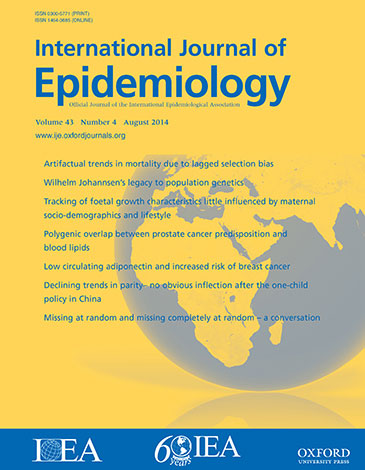Associations of psychosocial and physical work demands with all-cause mortality: a pooled analysis of prospective cohort studies
IF 5.9
2区 医学
Q1 PUBLIC, ENVIRONMENTAL & OCCUPATIONAL HEALTH
引用次数: 0
Abstract
Background The findings regarding mortality risk attributable to psychosocial and physical work demands are inconsistent. Pooled estimates using participant-level data from multiple cohort studies may provide more conclusive evidence. Methods Four prospective cohort studies conducted in England, Finland, France, and the USA were used (age 36–62 years; n = 41 760). We studied 34 903 and 36 076 individuals who had baseline (1981–2005) information on self-reported psychosocial and physical work demands, respectively. All-cause mortality until the year 2018 was ascertained through linkage to national registers, National Death Index, and company databases. We investigated the associations of psychosocial and physical demands with all-cause mortality separately for females and males using Cox regression models that were adjusted for socio-demographic and lifestyle factors. Using random-effects meta-analysis, we calculated pooled estimates of all-cause mortality for moderate and high exposure levels. Results During the mean follow-up of 25 years, 2105 deaths occurred among females and 5048 deaths occurred among males with information on psychosocial demands. The corresponding numbers for those with information on physical demands were 2176 and 5101. Fully adjusted models indicated that psychosocial demands were associated with both lower and higher all-cause mortality risks in both sexes. Physical demands increased the risk of all-cause mortality in both sexes and the association was strongest among males with moderate exposure levels (pooled hazard ratio 1.10, 95% confidence interval 1.02–1.19). Conclusion The relationship between psychosocial work demands and all-cause mortality remains inconclusive, whereas moderate physical work demands increase the mortality risk among males.社会心理和体力工作需求与全因死亡率的关联:前瞻性队列研究的汇总分析
关于心理社会和体力工作需求导致的死亡风险的研究结果并不一致。使用来自多个队列研究的参与者水平数据的汇总估计可能提供更确凿的证据。方法采用在英国、芬兰、法国和美国进行的四项前瞻性队列研究(年龄36-62岁;N = 41 760)。我们研究了34,903和36,076个人,他们分别有基线(1981-2005)自我报告的社会心理和体力工作需求信息。通过与国家登记册、国家死亡指数和公司数据库的联系,确定了2018年之前的全因死亡率。我们使用Cox回归模型分别调查了女性和男性的社会心理和生理需求与全因死亡率的关系,并对社会人口统计学和生活方式因素进行了调整。使用随机效应荟萃分析,我们计算了中等和高暴露水平的全因死亡率汇总估计值。结果在平均25年的随访中,有心理社会需求信息的女性死亡2105人,男性死亡5048人。有物理需求信息的相应数字分别为2176和5101。完全调整后的模型表明,社会心理需求与男女全因死亡率风险的高低相关。体力需求增加了两性全因死亡的风险,在中等暴露水平的男性中相关性最强(合并风险比1.10,95%置信区间1.02-1.19)。结论社会心理工作需求与全因死亡率之间的关系尚不明确,而适度的体力劳动需求增加了男性的死亡风险。
本文章由计算机程序翻译,如有差异,请以英文原文为准。
求助全文
约1分钟内获得全文
求助全文
来源期刊

International journal of epidemiology
医学-公共卫生、环境卫生与职业卫生
CiteScore
13.60
自引率
2.60%
发文量
226
审稿时长
3 months
期刊介绍:
The International Journal of Epidemiology is a vital resource for individuals seeking to stay updated on the latest advancements and emerging trends in the field of epidemiology worldwide.
The journal fosters communication among researchers, educators, and practitioners involved in the study, teaching, and application of epidemiology pertaining to both communicable and non-communicable diseases. It also includes research on health services and medical care.
Furthermore, the journal presents new methodologies in epidemiology and statistics, catering to professionals working in social and preventive medicine. Published six times a year, the International Journal of Epidemiology provides a comprehensive platform for the analysis of data.
Overall, this journal is an indispensable tool for staying informed and connected within the dynamic realm of epidemiology.
 求助内容:
求助内容: 应助结果提醒方式:
应助结果提醒方式:


